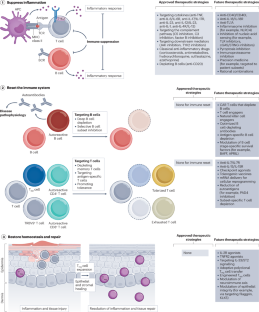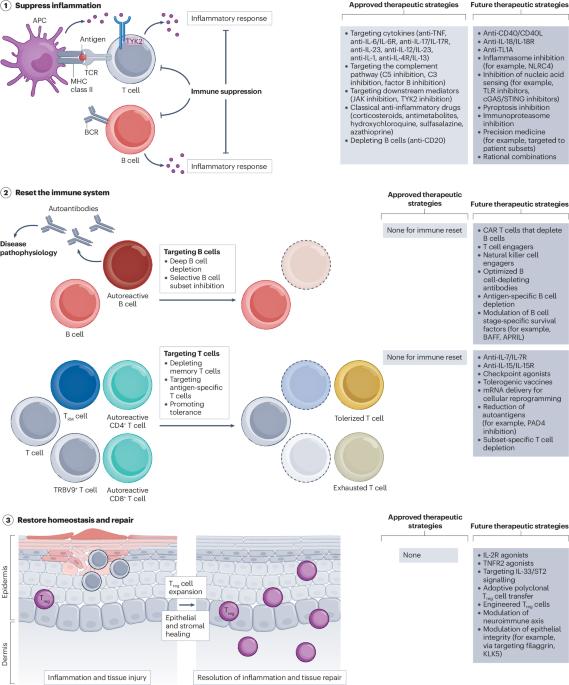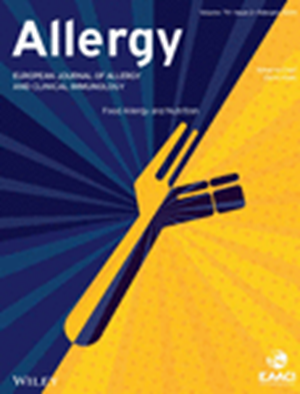序贯免疫疗法:迈向自身免疫疾病的治疗之路
IF 12.6
1区 医学
Q1 ALLERGY
引用次数: 0
摘要
尽管过去二十年来在治疗自身免疫性疾病方面取得了重大进展,但大多数疗法并不能治愈疾病,而且由于免疫系统受到广泛抑制,可能会增加感染风险。然而,随着人们对自身免疫性疾病病因认识的不断深入,以及嵌合抗原受体 T 细胞疗法等新型疗法的临床数据证明,有可能重建免疫平衡,延长缓解期,甚至治愈自身免疫性疾病。在此,我们提出了一个用于调节免疫系统的 "序贯免疫疗法 "框架,以帮助实现这一宏伟目标。该框架包括三个步骤:控制炎症;通过消除致病性免疫记忆细胞重置免疫系统;以及通过免疫调节剂和组织修复促进和维持免疫平衡。我们将讨论这三个步骤中每个步骤的现有药物和在研药物。我们还强调了因果人类生物学在确定和优先考虑新型免疫治疗策略方面的重要性,以及在特定患者亚群中应用这些策略的信息,从而实现有可能改变临床治疗的精准医疗方法。本文章由计算机程序翻译,如有差异,请以英文原文为准。


Sequential immunotherapy: towards cures for autoimmunity
Despite major progress in the treatment of autoimmune diseases in the past two decades, most therapies do not cure disease and can be associated with increased risk of infection through broad suppression of the immune system. However, advances in understanding the causes of autoimmune disease and clinical data from novel therapeutic modalities such as chimeric antigen receptor T cell therapies provide evidence that it may be possible to re-establish immune homeostasis and, potentially, prolong remission or even cure autoimmune diseases. Here, we propose a ‘sequential immunotherapy’ framework for immune system modulation to help achieve this ambitious goal. This framework encompasses three steps: controlling inflammation; resetting the immune system through elimination of pathogenic immune memory cells; and promoting and maintaining immune homeostasis via immune regulatory agents and tissue repair. We discuss existing drugs and those in development for each of the three steps. We also highlight the importance of causal human biology in identifying and prioritizing novel immunotherapeutic strategies as well as informing their application in specific patient subsets, enabling precision medicine approaches that have the potential to transform clinical care. Advances in understanding of the cause of autoimmune diseases and clinical data from novel therapeutic modalities such as chimeric antigen receptor T cells are providing evidence that it may be possible to re-establish immune homeostasis and, potentially, prolong remission or even cure autoimmune diseases. This article proposes a three-step ‘sequential immunotherapy’ framework for immune system modulation to help achieve this ambitious goal, and discusses existing drugs and those in development for each of the three steps.
求助全文
通过发布文献求助,成功后即可免费获取论文全文。
去求助
来源期刊

Allergy
医学-过敏
CiteScore
26.10
自引率
9.70%
发文量
393
审稿时长
2 months
期刊介绍:
Allergy is an international and multidisciplinary journal that aims to advance, impact, and communicate all aspects of the discipline of Allergy/Immunology. It publishes original articles, reviews, position papers, guidelines, editorials, news and commentaries, letters to the editors, and correspondences. The journal accepts articles based on their scientific merit and quality.
Allergy seeks to maintain contact between basic and clinical Allergy/Immunology and encourages contributions from contributors and readers from all countries. In addition to its publication, Allergy also provides abstracting and indexing information. Some of the databases that include Allergy abstracts are Abstracts on Hygiene & Communicable Disease, Academic Search Alumni Edition, AgBiotech News & Information, AGRICOLA Database, Biological Abstracts, PubMed Dietary Supplement Subset, and Global Health, among others.
 求助内容:
求助内容: 应助结果提醒方式:
应助结果提醒方式:


